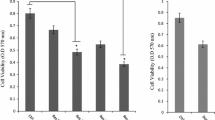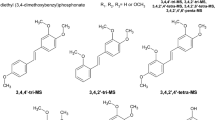Abstract
A natural product, resveratrol (3,4,40-trihydroxy-trans-stilbene), a phytoalexin found in grapes and other food products, is known as a cancer chemopreventive agent. We studied the in vitro biological activity of this compound by examining its effect on proliferation and differentiation in myeloid leukemia cell lines (HL-60, NB4, U937,THP-1, ML-1, Kasumi-1) and fresh samples from 17 patients with acute myeloid leukemia. Resveratrol (20 μM, 4 days) alone inhibited the growth in liquid culture of each of the 6 cell lines. Resveratrol (10 μM) enhanced the expression of adhesion molecules (CD11a, CD11b, CD18, CD54) in each of the cell lines except for Kasumi-1. Moreover, resveratrol (25 μM, 4 days) induced 37% of U937 cells to produce superoxide as measured by the ability to reduce nitroblue tetrazolium (NBT). The combination of resveratrol (10 μM) and all-trans-retinoic acid (ATRA) (50 nM, 4 days) induced 95% of the NB4 cells to become NBT-positive, whereas <1% and 12% of the cells became positive for NBT after a similar exposure to either resveratrol or ATRA alone, respectively. In U937 cells exposed to resveratrol (25 μM, 3 days), the binding activity of nuclear factor-κB (NFκB) protein was suppressed. Eight of 19 samples of fresh acute leukemia cells reduced NBT after exposure to resveratrol (20 μM, 4 days). Taken together, these findings show that resveratrol inhibits proliferation and induces differentiation of myeloid leukemia cells.
Similar content being viewed by others
References
Miller AB. Diet and cancer: a review.Acta Oncol. 1990;3:87–95.
Jang M, Cai L, Udeani GO, et al. Cancer chemopreventive activity of resveratrol, a natural product derived from grapes.Science. 1997; 275;218–220.
Heish T, Wu JM. Differential effects on growth, cell cycle arrest, and induction of apoptosis by resveratrol in human prostate cancer cell lines.Exp Cell Res. 1999;249:109–115.
Lu R, Serrero G. Resveratrol, a natural product derived from grapes, exhibits antiestrogenic activity and inhibits the growth of human breast cancer cells.J Cell Physiol. 1999;179:294–304.
Clement MV, Hirpara JL, Chawdhury SH, Pervaiz S. Chemopreventive agent resveratrol, a natural product derived from grapes, triggers CD95 signalling-dependent apoptosis in human tumor cells.Blood. 1998;92:996–1002.
Lanotte M, Martin-Thouvenin V, Najman S, Ballerini P, Valensi F, Berger R. NB4, a maturation inducible cell line with t(15;17) marker isolated from a human acute promyelocytic leukemia (M3).Blood. 1991;77:1080–1086.
Asou H, Tashiro S, Hamamoto K, Otsuji A, Kita K, Kamada N. Establishment of a human acute myeloid leukemia cell line (Kasumi-1) with 8;21 chromosomal translocation.Blood. 1991;77: 2031–2036.
Dignam JD, Levovitz RM, Roeder RG. Accurate transcriptional initiation by RNA polymerase II in a soluble extract from isolated mammalian nuclei.Nucl Acid Res. 1993;11:1475–1489.
Huang ME, Ye YC, Chen SR, et al. Use of all-trans retinoic acid in the treatment of acute promyelocytic leukemia.Blood. 1988;72: 567–572.
Degos L, Dombret H, Chomienne C, et al.All-trans retinoic acid as a differentiating agent in the treatment of acute promyelocytic leukemia.Blood. 1995;85:2643–2653.
Koeffler HP. Induction of differentiation of human acute myelogenous leukemia cells: therapeutic implications.Blood. 1983;62: 709–721.
Hozumi M. Differentiation therapy of leukemia: achievements, limitations and future prospects.Int J Hematol. 1998;68:107–129.
Sokoloski JA, Sartorelli AC. Induction of the differentiation of HL-60 promyelocytic leukemia cells by nonsteroidal anti-inflammatory agents in combination with low levels of vitamin D3.Leuk Res. 1998;22:153–161.
Sokolski JA, Narayanan R, Sartorelli AC. Enhancement by antisense oligonucleotides to NF-kappaB of the differentiation of HL- 60 promyelocytic leukemia cells induced by vitamin D3.Cancer Lett. 1998;125:157–164.
Author information
Authors and Affiliations
Corresponding author
About this article
Cite this article
Asou, H., Koshizuka, K., Kyo, T. et al. Resveratrol, a Natural Product Derived from Grapes, Is a New Inducer of Differentiation in Human Myeloid Leukemias. Int J Hematol 75, 528–533 (2002). https://doi.org/10.1007/BF02982118
Received:
Revised:
Accepted:
Published:
Issue Date:
DOI: https://doi.org/10.1007/BF02982118




